Flow Favorites: Wikileaks’ Lessons For Media Theory and Politics
Jayson Harsin / The American University of Paris
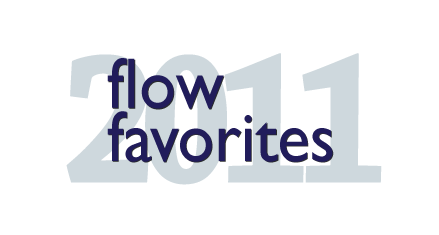
Every few years, Flow’s editors select our favorite columns from the last few volumes. We’ve added special introductions and included the original comments to the piece below. Enjoy!
Flow Columns Editor Caroline Leader:
Jayson Harsin’s exploration of WikiLeaks provides a wide shot of the famed web scandal within a larger political, global and ideological landscape. By presenting five theses, his article creates endless potential for further research. WikiLeaks on its own is one of those mouth-watering “texts” that presents both a complicated web of government control, international relationships and public figure grandstanding, but also reduces these seemingly intricate associations to playground behavior. For all the proclamations of “security threats” and “acts of terrorism” attributed to Assange’s actions, Harsin deftly identifies the factors that are really at play: reputations and status. And this is what I truly love about the article: that it identifies concepts with which we are familiar—self-interest, personal gain, relational back scratching—but also recognizes how the cables of communication are twisted by perception, interception, and power.Harsin reveals not only the political importance of this journalistic phenomenon, but also the vital interplay between new and old media forms. As he explains it, WikiLeaks relied on both the underground, fast-paced nature of online communication and the credibility of traditional print sources to gain exposure. Also, it upset what has historically been an airtight relationship between government and some elite press sources, which expose certain facts at certain times in order to create a narrative that serves national interests. What WikiLeaks reminded us, according to Harsin, is that the “rising power of new media production” could be “transforming hitherto well-contained spectacular public spheres and their democracies.”
While I may devolve into simplistic comparisons in this short explanation, Harsin seeks no easy answers and opens up a larger conversation about convergence culture, political economics in journalism, and more generally the power economics at the center of press coverage and diversion tactics.
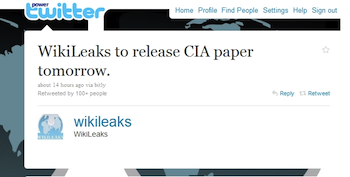
Regardless of whether one agrees with allegations that Wikileaks is an international security threat, a new media-facilitated champion of democratic accountability, or that Wikileaks founder Julian Assange is a rapist, it is an unmistakably rich object of media and political analysis. Arguably, l’Affaire Wikileaks (hereafter WA) holds lessons about changing relations between new and old media forms and production; attention, circulation, media capital and celebrity; political economy and journalism; and even democracy and international relations.
The WA above all begs attention to attention.1 The affair, not just the material released, became a huge agenda-setter in 2010. Several news organizations dubbed it a “top” story of 2010.2 In Canada, Wikileaks founder Assange was voted top newsmaker of the year by senior editors at Postmedia Network newspapers and canada.com.3 Even more impressively, Assange was nominated for Time Magazine’s Person of the Year.4 Other global news organizations, such as France’s Le Monde, named him person of the year.
European public opinion was split nearly 50/50 over Wikileaks’ releases, amid widespread government charges that Wikileaks had jeopardized international security. Meanwhile, sparring continues between renowned British investigative journalist Nick Davies and Bianca Jagger over Assange’s alleged sexual abuse. A sore spot in that exchange is the way celebrities can, via new media attention, influence public perception and opinion, despite, as Davies argues, who has the facts (i.e. professional investigative journalists). Now consider Wikileaks’ Google statistics (01/09/11):
• Blogs: 8,560,000
• Discussions: 1,440,000
• News: 17,800
• Videos: 12,000
• Images: 26,200,000
• Everything: 72,000,000
• Compare Hillary Clinton everything: 10,900,000
The very reason Wikileaks evokes such strong split reactions in public opinion, and such widespread old journalism support, symbolizes dreams and realities in this increasingly globalized convergence culture (CC). For many who support Wikileaks, it may well symbolize precisely the rising power of new media production transforming hitherto well-contained spectacular public spheres and their democracies. Instead of the old back-scratching relationship between journalism and professional politics (with grassroots movements struggling to get media attention using Civil Rights Era strategies), now supposedly non-elites could start up a Wiki and start producing a profoundly new kind of democratic accountability formerly relegated to Habermasian ideal types. Wikileaks symbolized how “We the People” can matter again, via new media production and circulation technologies from the website, to video and photo-editing, the cell phone to the laptop. From the beginning, Wikileaks claimed a public service. According to the original and current web page, Wikileaks “publish material of ethical, political and historical significance while keeping the identity of our sources anonymous, thus providing a universal way for the revealing of suppressed and censored injustices.” On the other hand, WA symbolizes the ongoing formidable power of old elites to re-frame agendas and govern by public opinion polling.
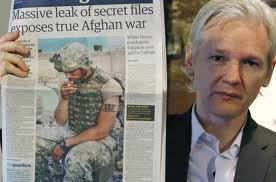
Leaving aside the theories of why citizens and government might identify/be disgusted with Wikileaks, the dynamics of attention acquisition suggest several points peculiar to CC, about which I’ll offer five theses.
First, information-brokering political sites can become new primary definers of public agendas and even for old news/journalism, their democratizing quality being that their agents are not professional journalists or politicians. But, for circulation and audience they rely on older news organizations and their resources for re-distribution.5 Thus, with their founder and unofficial director hounded by subpoenas and their site (and mirror sites) under multi-government cyber-attack, Wikileaks chose to release documents—from July 2010 to the present—to select elite global news organizations who would officially leak the classified material (perhaps also as legal strategy): New York Times, The Guardian, El Pais, and then in November, Le Monde. Here, e-democracy depends on old news for media capital and thus public significance.
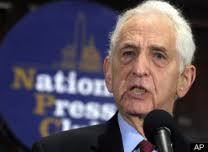
Second, to return to Bianca Jagger, the attention economy that made Wikileaks a top story of 2010 and Julian Assange runner-up for Time Person of the Year is also a parasitic celebrity CC. Out of celebrity retirement to publicize the defense of Wikileaks came Daniel Ellsberg, the U.S. military analyst who notoriously/heroically released the government-embarrassing Pentagon Papers in 1971. Ellsberg claimed, “The truth is that every attack now made on WikiLeaks and Julian Assange was made against me and the release of the Pentagon Papers at the time.”6 Other global celebrities adding to Wikileaks’ media capital, public opinion support and circulation include Noam Chomsky and Republican Congressman Ron Paul, the latter of whom proclaimed: “Lying is not Patriotic.”7 Established opinion leader-celebrities, or simply celebrities who may wield media capital to become political opinion leaders enhanced the media capital and circulation of Wikileaks and Assange as well as their own media capital in a synergistic dynamic.8
But Assange’s own rhetorical-PR gifts in using CC for celebrity capital should not be overlooked. Assange/Wikileaks could have dumped the thousands of documents on their site each time and tweeted them or notified old news sources. Instead, he time and again used interviews (or tweets) to prime news organizations and larger audiences for an upcoming release, which of course would rarely be everything he had, whether it was “5 GB” on Bank of America, an “insurance file” whose key would be publicly released to unlock all files in the event of harm to Wikileaks or himself or thousands of documents inappropriate for synchronous release because names were being removed to protect innocents. Assange has reproduced TV serial-style intrigue, teasers at end of an episode to build his media capital and tantalize salivating audiences.
Third, the reaction of primary defining, resource-rich government sources, for media content production, monitoring, and recirculation, reveals the existing obstacles “politico-cultural” producers face trying to set/frame elite news agendas, address audiences and create publics/counterpublics. The response was hardly one of rational-critical debate, with those like Hillary Clinton calling Assange an international “security threat,” basically implying what bolder voices such as Rep. Peter King, Chair of the Homeland Security Committee, spouted less subtly: Assange is a terrorist.9 American public opinion followed the governmental frame: nearly 60% said they wanted Assange prosecuted.
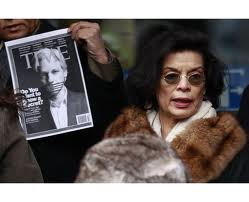
While prominent journalist Nick Davies defended the British arrest of Assange as based on substantial rape charges, the timing of the accusations do indeed bear the qualities of a classic rumor bomb.10 As with rumor bombs like “Obama is a Muslim” or “Shirley Sherrod is a racist,” the targets are forced to react quickly, not on their own terms, perhaps even responding with their own tables-turning accusations or rumor bombs. Thus, if Assange is guilty of rape, the timing of international governmental support for an Interpol arrest warrant, after thousands of diplomatic cables had been released, may be met with public cynicism. On the other hand, international 50/50 public opinion splits suggest the power of governments and elite news to frame and influence public opinion. Despite the rhetorical flourishes of Ron Paul, Noam Chomsky and Bianca Jagger, how often was international news agenda occupied with a rational defense by the United States and other countries/political actors of the lies and misleading elite projects revealed in the documents? Of course, the strategy is to deflect attention.
Fourth, the condemnation of Wikileaks by state actors as oppositional as the U.S. and Iran might give some spectators pause, wondering if despite perceived differences, international elites are tremendously invested in maintaining technocracy amid vague semblances of representative democracy and in setting policy agendas without the meddling of newcomer actors in/of e-democracy. Is it not telling that Russia’s Putin condemned the Assange arrest and opposition to Wikileaks as “un-democratic,” while Russian President Medvedev declared Assange should receive the Nobel Prize?11 The evidence suggests a threat to elite international relations and also the opportunity for some elites to capitalize on that threat for their own foreign policy agendas (instead of Russia, it’s the U.S. they would have accused of being undemocratic in the international court of opinion).
[youtube]http://www.youtube.com/watch?v=TpzfOmdM6dk&feature=player_embedded[/youtube]
Fifth, we see more evidence of how the great potential of cultural production/agency is constrained by a powerful political economy of media presentation and attention. Just look at the dramatic movement between hosts; Wikileaks’ old hosts being the target of possible state-resourced hacks, their move to Amazon, who subsequently shut it down allegedly for violation of policy, and then their move to French company OVH where they are currently under unresolved legal attacks by the French government. Appearance on the Internet is not guaranteed simply because one has a laptop, or even the money to purchase a domain name.
Another economic-power issue involves funding. Last December, Paypal refused to take any more donations to Wikileaks (which runs on donations); a few days later Swiss bank Postfinance announced it was freezing Assange’s assets totaling 31,000 Euros; then Mastercard and Visa refused to handle donations, followed by Bank of America.
And yet again, one can’t overlook how a popular Internet response did not let this political economy go unchallenged. Some analysts cite the Streisand Effect to explain Wikileaks, where any attempt to censor the Internet is met with efforts to reproduce/re-circulate the material under threat.12 This is precisely what happened last December when hundreds of mirror sites appeared as “Operation Payback.” Anonymous groups of supporters have also periodically attacked and hacked the sites of Wikileaks’ detractors, again in December under the banner of “Operation Avenge Assange.”
Heroic or villainous, Assange and Wikileaks are indisputably a sign of the times.
Image Credits:
1. Wikileaks Twitter Feed Screen Capture / Twitter
2. Julian Assange / Reuters
3. Daniel Ellsberg / AP
4. Bianca Jagger / Reuters
Original comments:
Caroline Ferris Leader said:
Great article, Jayson. I am especially interested in your section on nations with seemingly disparate goals and ideologies jumping on the anti-Assange bandwagon. Despite differences, it seems that we’re working with a global system where each nation’s must news media feels obligated to give a canned respond in order to gain credibility as a meaning-making state.
-January 20th, 2011 at 6:44 am
Please feel free to comment.
- Throughout this article, I’m building on my theory of convergence culture and politics articulated in “That’s Democratainment: Obama, Rumor Bombs and Primary Definers,” in Flow, in which I critically engage several other theorists. For an outline of the characteristics of the Rumor bomb concept see my articles in Flow. [↩]
- The Los Angeles Times top 100 stories had Wikileaks’ July 25 release of thousands of classified military intelligence documents dating from 2004-2009 at 52 (That’s before Obama’s announcement ending combat in Iraq, Glenn Beck’s rally to “restore honor,” and the Ground Zero Mosque). [↩]
- Additionally, Assange was ranked fourth in an Ipsos-Reid poll of 1,044 Canadians, and an informal survey of editors revealed six out of 10 Postmedia publications felt Assange “had affected profoundly how information is seen and delivered.” Found in “Wikileaks’ Julian Assange is 2010’s Top Newsmaker, Montreal Gazette, Dec. 26, 2010, retrieved 9 Jan. 2011 at http://www.montrealgazette.com/news/WikiLeaks+Julian+Assange+2010+newsmaker/4027279/story.html#ixzz1AYnfotxA [↩]
- Time Magazine’s Person of the Year award went to another new media celebrity, Facebook founder Mark Zuckerberg. [↩]
- As McChesney and Nichols, among others, have recently argued, non-professional news sites statistically do not generate news, because they don’t have the resources and training; they re-circulate and comment on it. However, Wikileaks has shown the opposite potential in convergence culture, to set old news agendas. Yet, one can argue that it is still dependent on that old news media redistribution for its media capital. See McChesney, Robert and John Nichols, The Death and Life of American Journalism (Philadelphia: Perseus., 2010). [↩]
- Daniel Ellsberg et. Al, “Daniel Ellsberg Praises Wikileaks,” SF Gate, Dec. 7, 2010. Retrieved 9 January 2010 at http://www.sfgate.com/cgi-bin/blogs/opinionshop/detail?entry_id=78596 [↩]
- Ron Paul, “Lying Is Not Patriotic,” Anti-war.com, Dec. 10, 2010. Retrieved 9 January, 2011 at http://original.antiwar.com/paul/2010/12/09/lying-is-not-patriotic/ [↩]
- For an important argument that claims media capital may trump capital in other fields (via Bourdieu’s field theory), see Nick Couldry, “Media Meta-Capital: Extending the Range of Bourdieu’s Field Theory,” Theory and Society 32 (5-6), 653-677; see my discussion of the concept here: http://flowjournal.org/2010/10/thats-democratainment/ [↩]
- Michael Moore, “Why I Am Posting Bail for Julian Assange,” Huffington Post, Jan. 9, 2011, Retrieved 9 January 2011 at http://www.huffingtonpost.com/michael-moore/why-im-posting-bail-money_b_796319.html [↩]
- For an outline of the characteristics of the rumor bomb concept see my articles in this journal: http://flowjournal.org/2008/12/the-rumor-bomb-on-convergence-culture-and-politics-jayson-harsin-american-university-of-paris/, http://flowjournal.org/2010/10/thats-democratainment/; and Jayson Harsin “The Rumor Bomb ‘John Kerry is French, i.e. Haughty, Foppish, Socialist, and Gay,” The Diffusion of Social Movements, eds. Rebecca Givan and Susan Soule (New York: Cambridge University Press, 2010). [↩]
- The sources were double-checked after consulting “Wikileaks,” Wikipedia, retrieved 9 January 2011 at http://en.wikipedia.org/wiki/Wikileaks#cite_note-282 [↩]
- Agence France Presse, “How Wikileaks Stays Online Despite Disputes,” Montreal Gazette, Dec. 10, 2010, retrieved 9 Jan. 2011 at http://www.montrealgazette.com/news/world/WikiLeaks+stays+online+despite+disputes/3944441/story.html [↩]
Pingback: Flow favorites 2011 « Digital Storytellers
This is a very interesting article that makes a couple of great points.
1)The fact that nations who have disparate goals would act together in speaking out against wiki-leaks tells me that these nations have a common interest in protecting their own sphere’s of power which can be directly threatened by a international group like wiki-leaks that does not respond to the usual economic/legal pressures that are placed on traditional media outlets because of their own corporate makeup.
With that being said the consolidation of media companies seems to ensure the older elite the ability to clamp down on the internet. This is exemplified by the trouble wiki-leaks is having finding places to host its content as described in the authors fifth thesis. We only have to look at the history of the consolidation of new forms of media like radio and television to find a general model/precedent for how this will occur and is occurring today.
I find it interesting that Assange was motivated to operate through “old” news entities to disperse his “new” content, and if anything this somewhat shows how much control these media outlets retain over visibility and what is considered significant news to our society. The stories regarding Assange and his personal troubles in dealing with government censorship (be it obvious or subtle) and accusation of rape seem to be given more coverage than the actual controversial documents that caused such a stir in the first place. The narrative of his struggle and the rumors regarding his sexual actions confound the principle democratic purpose of Wikileaks. This in turn does indeed reveal interesting connections between the government and major media outlets, and one wonders how much control the government and the media have in constructing what should be insignificant narrative stories that diminish public appreciation of new media institutions that promote government transparency to an extent greater than what exists today.
“The WA above all begs attention to attention.”
“The very reason Wikileaks evokes such strong split reactions in public opinion, and such widespread old journalism support, symbolizes dreams and realities in this increasingly globalized convergence culture (CC)”
“…how often was international news agenda occupied with a rational defense by the United States and other countries/political actors of the lies and misleading elite projects revealed in the documents? Of course, the strategy is to deflect attention.”
I have stitched together the above quotes because I would like to draw attention to the large amount of apathy in today’s CC. It seems the game was never understood as being moral; it was always known to be fundamentally about who/what holds the greatest amount of power, and who this possession of power will benefit. It is interesting to me that so many should be outraged when the powers that be (who benefit them) are ‘leaked’ in on, and defend them under the heading of ‘threat’ rather than ’embarrassment’.
Adding onto that, this article greatly articulates the pervasiveness of currency. Wikileaks, because of its inevitable reliance upon and exchanging of money, is itself a malleable entity, according to who holds the greatest amount of power over it (PayPal, BoA, Mastercard, Visa, etc–as well as the blackmailing tactics employed by Assange to project the most efficient, informationally profitable leaks)
What is intellectually titillating about Assange and the undeniable impact wikileaks has had on the global media-sphere is that through a team of journalists, a little top secret information piracy, and a few webpages (which, lets face, we’ll be calling the matrix in a decade or so), the public is now aware of the lack of transparency of not just the US government, but all a nice handfull of countries that have been apart of or fallen victim to our ‘democratic’ missions. I feel that news coverage has increasingly become a joke due to the filters that are embodied in the form of corporate talking heads. CNN, Abc, Fox, and other what-have-you news programs have now incorporated videos from this treacherous place, the web, as if it took a team of journalists hours of research to locate thirty funny seconds of a dog licking itself. Whats more is you can now text to vote which article you would like to see! It’s become clear that hard hitting reporting for the sake of the story is not as welcome as it used to be. Rather than reporting the numerous ways our tax dollars are put to work, it seems as if the industry would rather disillusion and misinform its people than have the masses aware. Perhaps the publics is not ready to handle it. Also, a program that Uncle Sam runs that we fund are satellites emitting concentrated microwaves to shoot down the numerous ballistic missiles flying around this rock everyday.
Is Wikileaks any worse than Rupert Murdoch and the phone tapping scandals that have yet to be fully scoped? One preyed on governments and people in authority. The other exploited individuals.
Cheers
Rosemary Breen
Psychic Revolution
Pingback: Free Speech Ain’t Free : : वसुधैव कुटुंबकम
Pingback: Free Speech Ain’t Free « elcidharth
Pingback: Barack vs Bradley and I | elcidharth